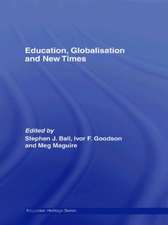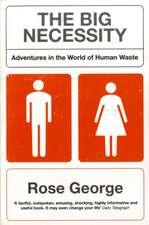Knowledge: Is Knowledge Power?: Key Ideas
Autor Marian Adolf, Nico Stehren Limba Engleză Hardback – 26 sep 2016
| Toate formatele și edițiile | Preț | Express |
|---|---|---|
| Paperback (1) | 376.87 lei 43-57 zile | |
| Taylor & Francis – 19 sep 2016 | 376.87 lei 43-57 zile | |
| Hardback (1) | 735.24 lei 43-57 zile | |
| Taylor & Francis – 26 sep 2016 | 735.24 lei 43-57 zile |
Din seria Key Ideas
-
 Preț: 154.57 lei
Preț: 154.57 lei -
 Preț: 288.80 lei
Preț: 288.80 lei -
 Preț: 293.64 lei
Preț: 293.64 lei -
 Preț: 293.56 lei
Preț: 293.56 lei -
 Preț: 280.59 lei
Preț: 280.59 lei -
 Preț: 323.83 lei
Preț: 323.83 lei -
 Preț: 286.40 lei
Preț: 286.40 lei -
 Preț: 157.20 lei
Preț: 157.20 lei -
 Preț: 153.62 lei
Preț: 153.62 lei -
 Preț: 295.14 lei
Preț: 295.14 lei -
 Preț: 151.08 lei
Preț: 151.08 lei -
 Preț: 153.43 lei
Preț: 153.43 lei -
 Preț: 293.67 lei
Preț: 293.67 lei -
 Preț: 359.24 lei
Preț: 359.24 lei -
 Preț: 279.55 lei
Preț: 279.55 lei -
 Preț: 153.51 lei
Preț: 153.51 lei -
 Preț: 153.81 lei
Preț: 153.81 lei -
 Preț: 165.01 lei
Preț: 165.01 lei -
 Preț: 353.12 lei
Preț: 353.12 lei - 26%
 Preț: 763.01 lei
Preț: 763.01 lei - 26%
 Preț: 818.77 lei
Preț: 818.77 lei -
 Preț: 349.15 lei
Preț: 349.15 lei - 26%
 Preț: 761.39 lei
Preț: 761.39 lei - 15%
 Preț: 445.99 lei
Preț: 445.99 lei -
 Preț: 400.93 lei
Preț: 400.93 lei - 26%
 Preț: 764.22 lei
Preț: 764.22 lei - 34%
 Preț: 763.01 lei
Preț: 763.01 lei -
 Preț: 428.13 lei
Preț: 428.13 lei - 9%
 Preț: 898.73 lei
Preț: 898.73 lei - 13%
 Preț: 324.85 lei
Preț: 324.85 lei -
 Preț: 288.24 lei
Preț: 288.24 lei - 23%
 Preț: 327.66 lei
Preț: 327.66 lei - 26%
 Preț: 245.53 lei
Preț: 245.53 lei -
 Preț: 359.47 lei
Preț: 359.47 lei -
 Preț: 384.49 lei
Preț: 384.49 lei -
 Preț: 362.62 lei
Preț: 362.62 lei - 26%
 Preț: 926.90 lei
Preț: 926.90 lei -
 Preț: 332.59 lei
Preț: 332.59 lei - 26%
 Preț: 760.16 lei
Preț: 760.16 lei
Preț: 735.24 lei
Preț vechi: 989.73 lei
-26% Nou
Puncte Express: 1103
Preț estimativ în valută:
140.71€ • 146.16$ • 116.88£
140.71€ • 146.16$ • 116.88£
Carte tipărită la comandă
Livrare economică 03-17 februarie 25
Preluare comenzi: 021 569.72.76
Specificații
ISBN-13: 9781138685673
ISBN-10: 1138685674
Pagini: 326
Dimensiuni: 129 x 198 mm
Greutate: 0.45 kg
Ediția:Revised
Editura: Taylor & Francis
Colecția Routledge
Seria Key Ideas
Locul publicării:Oxford, United Kingdom
ISBN-10: 1138685674
Pagini: 326
Dimensiuni: 129 x 198 mm
Greutate: 0.45 kg
Ediția:Revised
Editura: Taylor & Francis
Colecția Routledge
Seria Key Ideas
Locul publicării:Oxford, United Kingdom
Public țintă
Postgraduate and UndergraduateCuprins
Preface
Introduction
1. Classical Conceptions of Knowledge
2. Knowledge about Knowledge
2.1. Attributes of Knowledge
2.2. Knowledge as a Capacity to Act
2.3. Knowledge and Information
2.4. Practical Knowledge
2.5. Additional Knowledge
2.6. The Uneven Development of Knowledge
2.7. The Limits of the Growth of Knowledge
2.8. A Sociological Concept of Knowledge and its Context
3. The Knowledge of the Powerful
3.1. Knowledge is Power and Power is Knowledge
3.2. The Iron Law of Oligarchy
3.3. Knowledge/Power
3.4. The Global Class
4. Non-knowledge
4.1. Sigmund Freud and Friedrich August von Hayek
4.2. Observations about Non-Knowledge
4.3. Non-knowledge as a Myth?
4.4. Non-knowledge
4.5. Ignorance
4.6. Knowledge Gaps
4.7. Non-knowledge about Non-knowledge
5. Policing Knowledge
5.1. The Self-realization of Knowledge
5.2. The Self-protection of Knowledge
5.3. Knowledge becomes Superfluous
6. Forms of Knowledge
6.1. Everyday Knowledge
6.2. The Power of Everyday Knowledge
6.3. Indigenous or Traditional Knowledge
6.4. Tacit Knowledge
7. Global Knowledge
7.1. Basic Reflections on Global Knowledge
7.2. Global Knowledge Worlds
7.3. Structures of Global Knowledge Spaces
7.4. Forms of Global Knowledge Worlds
7.5. Attributes of Knowledge that Promote Globalization
7.6. Limits to the Globalization of Knowledge
7.7. The Project of Worldwide Worlds of Knowledge, and the Doubts about its Likelihood
8. Digital Worlds and Knowledge/Information
8.1. Information, Communication and Technology
8.2. Societal Communication and Shared Knowledge
8.3. Analyzing the Ubiquity of the Media: Mediatization
8.4. New Media, Old Media and the Hybrid Media System
8.5. ITC’s, Surveillance and Knowledge
8.6. Communication, Media and Knowledge
9. Functions of Knowledge
9.1. Knowledge as Power and Authority
9.2. The Power of Ideas
9.3. Knowledge and the Economy
9.4. Knowledge as Property and Public Good
10. The Price of Knowledge
10.1. Human Capital
10.2. Symbolic Capital
10.3. Patents
10.4. Taxation
11. The Benefits of Knowledge
11.1. The Distribution of Knowledge
11.2 Knowledge, Power and Participation
11.3. The knowledge society
Bibliography
Index
Introduction
1. Classical Conceptions of Knowledge
2. Knowledge about Knowledge
2.1. Attributes of Knowledge
2.2. Knowledge as a Capacity to Act
2.3. Knowledge and Information
2.4. Practical Knowledge
2.5. Additional Knowledge
2.6. The Uneven Development of Knowledge
2.7. The Limits of the Growth of Knowledge
2.8. A Sociological Concept of Knowledge and its Context
3. The Knowledge of the Powerful
3.1. Knowledge is Power and Power is Knowledge
3.2. The Iron Law of Oligarchy
3.3. Knowledge/Power
3.4. The Global Class
4. Non-knowledge
4.1. Sigmund Freud and Friedrich August von Hayek
4.2. Observations about Non-Knowledge
4.3. Non-knowledge as a Myth?
4.4. Non-knowledge
4.5. Ignorance
4.6. Knowledge Gaps
4.7. Non-knowledge about Non-knowledge
5. Policing Knowledge
5.1. The Self-realization of Knowledge
5.2. The Self-protection of Knowledge
5.3. Knowledge becomes Superfluous
6. Forms of Knowledge
6.1. Everyday Knowledge
6.2. The Power of Everyday Knowledge
6.3. Indigenous or Traditional Knowledge
6.4. Tacit Knowledge
7. Global Knowledge
7.1. Basic Reflections on Global Knowledge
7.2. Global Knowledge Worlds
7.3. Structures of Global Knowledge Spaces
7.4. Forms of Global Knowledge Worlds
7.5. Attributes of Knowledge that Promote Globalization
7.6. Limits to the Globalization of Knowledge
7.7. The Project of Worldwide Worlds of Knowledge, and the Doubts about its Likelihood
8. Digital Worlds and Knowledge/Information
8.1. Information, Communication and Technology
8.2. Societal Communication and Shared Knowledge
8.3. Analyzing the Ubiquity of the Media: Mediatization
8.4. New Media, Old Media and the Hybrid Media System
8.5. ITC’s, Surveillance and Knowledge
8.6. Communication, Media and Knowledge
9. Functions of Knowledge
9.1. Knowledge as Power and Authority
9.2. The Power of Ideas
9.3. Knowledge and the Economy
9.4. Knowledge as Property and Public Good
10. The Price of Knowledge
10.1. Human Capital
10.2. Symbolic Capital
10.3. Patents
10.4. Taxation
11. The Benefits of Knowledge
11.1. The Distribution of Knowledge
11.2 Knowledge, Power and Participation
11.3. The knowledge society
Bibliography
Index
Notă biografică
Marian Adolf is Professor of Media Culture at Zeppelin University. His research interest revolves around the interface of media and social change, communication and cultural theory. He has held appointments as Visiting Professor at Quest University and Alpen-Adria-University Klagenfurt, and currently serves as chair of the German Communication Association’s section for Media Sociology.
Nico Stehr is Karl Mannheim Professor of Cultural Studies at Zeppelin University in Friedrichshafen Germany. He formerly held professorships at the University of Alberta, Edmonton, The University of British Columbia, Ludwig Maximilians University in Munich and was Paul F. Lazarsfeld Guest Professor at the University of Vienna. He has published widely on the topic of Knowledge and is one of the proponents of Knowledge Society, a term that has acquired widespread currency not only in academia.
Nico Stehr is Karl Mannheim Professor of Cultural Studies at Zeppelin University in Friedrichshafen Germany. He formerly held professorships at the University of Alberta, Edmonton, The University of British Columbia, Ludwig Maximilians University in Munich and was Paul F. Lazarsfeld Guest Professor at the University of Vienna. He has published widely on the topic of Knowledge and is one of the proponents of Knowledge Society, a term that has acquired widespread currency not only in academia.
Descriere
Talk of knowledge is ubiquitous in the modern world. Whether we talk of know-how, innovation or education, knowledge is always involved. But despite its prominence, knowledge often remains nebulous. This book explores the category of knowledge from a sociological perspective, and traces the concept of knowledge as the very fabric of modern society.







